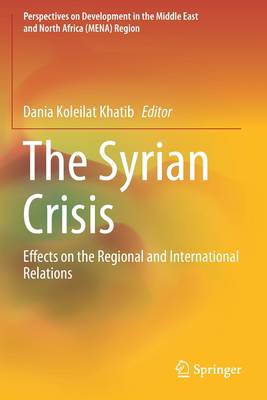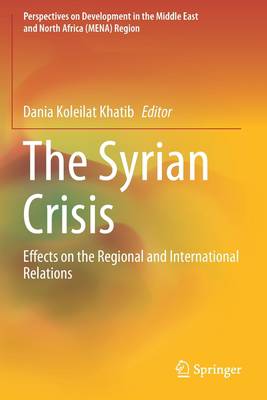
- Retrait gratuit dans votre magasin Club
- 7.000.000 titres dans notre catalogue
- Payer en toute sécurité
- Toujours un magasin près de chez vous
- Retrait gratuit dans votre magasin Club
- 7.000.0000 titres dans notre catalogue
- Payer en toute sécurité
- Toujours un magasin près de chez vous
The Syrian Crisis
Effects on the Regional and International Relations
125,95 €
+ 251 points
Description
This book analyzes the impact and relevance of the Syrian crisis on regional and international relations. Developing into a proxy war, the Syrian crisis has been a battleground for regional dominance. It has also created an opportunity for new states to emerge on the world affairs scene. Russia, for instance, had been keeping a low profile since the fall of the Soviet Union, but took a leading role in the Syrian crisis reasserting itself against the West regionally. The Syrian crisis has also been a catalyst in reshaping many interstate relations and allowing countries such as Russia, Iran, Turkey and China to play an increasingly important geopolitical role.
There have been many international ramifications to the Syrian crisis. While the crisis led to an Iranian-Russian rapprochement, it was also a catalyst to more cooperation between Russia and Saudi Arabia; more importantly, it also forced states with opposing views about the crisis -- Turkey, Iran and Russia -- to forge an alliance. Further, the crisis created tensions between the US and Turkey with China on the one hand balancing its interests between the Gulf and Iran whilst focusing on its ambitious Belt and Road Initiative and trying on the other hand to contain Islamic militancy in Syria.
The book looks at issues that are usually ignored when discussing Syria such as the strategic control over its hydrocarbon resources, as well as the power of propaganda in portraying realities. It features the use of non-state actors by regional competing powers and the role of local councils in stabilizing the country. The edited volume brings together contributions by authors with different backgrounds who present conflicting views reflecting the divergence between the various stakeholders about the Syrian crisis.
There have been many international ramifications to the Syrian crisis. While the crisis led to an Iranian-Russian rapprochement, it was also a catalyst to more cooperation between Russia and Saudi Arabia; more importantly, it also forced states with opposing views about the crisis -- Turkey, Iran and Russia -- to forge an alliance. Further, the crisis created tensions between the US and Turkey with China on the one hand balancing its interests between the Gulf and Iran whilst focusing on its ambitious Belt and Road Initiative and trying on the other hand to contain Islamic militancy in Syria.
The book looks at issues that are usually ignored when discussing Syria such as the strategic control over its hydrocarbon resources, as well as the power of propaganda in portraying realities. It features the use of non-state actors by regional competing powers and the role of local councils in stabilizing the country. The edited volume brings together contributions by authors with different backgrounds who present conflicting views reflecting the divergence between the various stakeholders about the Syrian crisis.
Spécifications
Parties prenantes
- Editeur:
Contenu
- Nombre de pages :
- 242
- Langue:
- Anglais
- Collection :
Caractéristiques
- EAN:
- 9789811550522
- Date de parution :
- 21-08-21
- Format:
- Livre broché
- Format numérique:
- Trade paperback (VS)
- Dimensions :
- 156 mm x 234 mm
- Poids :
- 358 g

Les avis
Nous publions uniquement les avis qui respectent les conditions requises. Consultez nos conditions pour les avis.





